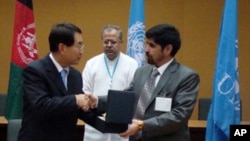Senior Afghanistan officials and the U.N. Environment Program have agreed to work together to fight the illegal trade in banned chemicals.
In a memorandum of understanding signed in Bangkok, the United Nations and Afghanistan took aim at chemicals that scientists say harm the ozone layer and contribute to climate change.
Afghanistan Ministry of Finance Deputy Minister For Customs And Revenue Sa'id Mubin Shah says the United Nations will help train Afghan customs officials to identify the dangerous chemicals.
"Especially in the current time in need of building our capacity for the customs officials; without capacity the official cannot do many things so that is why it is very important, and identification especially of the chemical which is destroying the ozone layer," he said.
The agreement sets up a framework for helping Afghan customs officers implement the Montreal Protocol.
The 1989 protocol calls for phasing out the use of chlorofluorocarbons and hydro-chlorofluorocarbons, which scientists say damage the ozone layer. The ozone layer blocks harmful ultraviolet rays from the sun.
Scientists also say that CFCs act as greenhouse gases, which contribute to climate change.
UNEP Regional Director Young Woo Park says the agreement will help reduce illegal trade in the banned chemicals in South Asia. "The country, as the world knows, has the internal war, but they still show the importance of the environment and they willingly sign this MOU to make to deal with one of the environmental issues - ozone layer destruction; also at the same time how to deal with the illegal traffic of chemical substances," he said.
Park says the trade is difficult to curb as the chemicals are cheap and there is easy access to supplies outside Afghanistan. But he says the Afghan government has pledge to halt the trade within its borders despite the country's war.
The UNEP estimates that local and international crime syndicates earn up to $30 billion annually from the illegal trade in environmentally sensitive commodities such as ozone-depleting substances, toxic chemicals, hazardous waste and endangered species.
Afghanistan Signs Understanding With UN to Fight Illegal Chemical Trade




